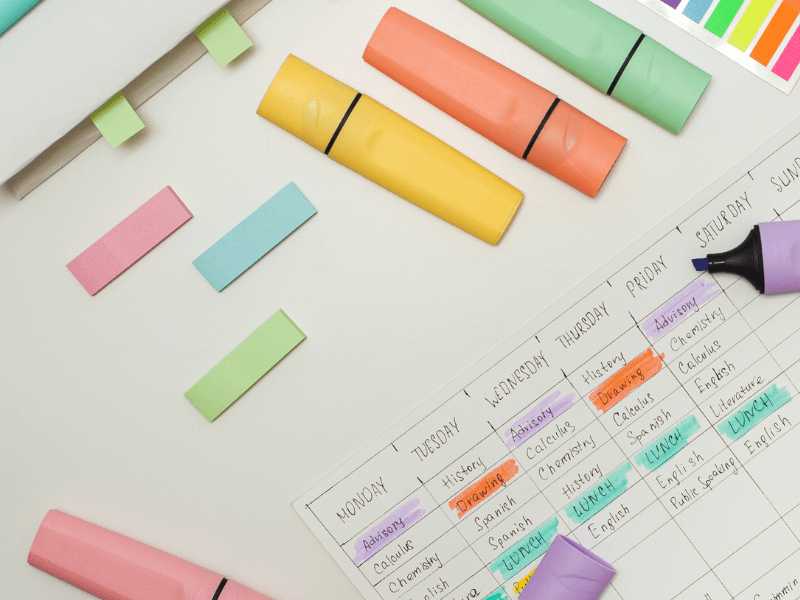As exam season approaches, effective revision strategies become crucial for academic success. Follow these top revision tips to ace your exams with confidence.
Table of Contents
- Create the Best Revision Schedule for Your Needs
- Find Your Ideal Revision Style: Tips for Personalised Learning
- Understand, Don’t Memorise: Unlocking Exam Success with Comprehension
- Practice Makes Perfect: Mastering Exam Formats with Past Papers
- Rejuvenate and Reward: Striking the Perfect Balance
- Seek Support: You’re Not Alone on This Journey
- Exam Day Preparation: Stay Calm and Composed with These Tips
- Conclusion
1) Create the Best Revision Schedule for Your Needs

The foundation of successful exam revision lies in crafting the best revision schedule tailored to your requirements.
Evaluate the material you need to cover and the available time, then break it down into manageable chunks.
Dedicate a few hours daily to revision, mixing up subjects to maintain engagement.
A well-structured schedule will keep you organised and in control.
One of the best tips for revision is to create a realistic timetable. Here are some key points to consider:
- Start by listing all the topics and subjects you need to revise.
- Allocate specific time slots for each one, factoring in regular breaks and self-care activities.
- This will help you stay on track and avoid feeling overwhelmed.
Another key tip for effective revision is to experiment with different techniques until you find what works best for you:
- Some students thrive in quiet environments, while others prefer background music or study groups.
- Customise your revision materials, such as notes and flashcards, to suit your learning style.
- The more personalised your approach, the more engaged and motivated you’ll be.
2) Find Your Ideal Revision Style: Tips for Personalised Learning

Every student is unique, so experiment with different revision styles to find the one that suits you best.
Some thrive in quiet environments, while others prefer background music. Revising with a friend can be motivating, but beware of distractions.
Customise your notes with colour coding, diagrams, or whatever aids your understanding – the more personal, the better.
One of the best tips for revision is to find a method that keeps you engaged and interested:
- Create mind maps or infographics to visualise the information.
- Record yourself explaining key concepts and listen back to the recordings.
- Don’t be afraid to try out different approaches until you discover what works for you.
Collaborating with classmates can also be a great way to reinforce your understanding and identify any gaps in your knowledge. Just be sure to stay focused and avoid getting side-tracked by social chit-chat.
3) Understand, Don’t Memorise: Unlocking Exam Success with Comprehension

Memorisation alone won’t suffice for exams. Strive to truly comprehend the material you’re revising.
If a concept eludes you, seek alternative explanations or reach out to your teacher or knowledgeable peers for clarification.
Understanding is the key to achieving exam success.
One of the best tips for revision is to actively engage with the material, rather than simply reading through it passively:
- Try explaining key concepts out loud to yourself or a study partner.
- Create practice questions or quizzes to test your knowledge.
- Focus on understanding the underlying principles and ideas, not just memorising facts.
Exams are not just about recalling information; they’re also about demonstrating your ability to apply your knowledge and think critically.
By focusing on comprehension, you’ll be better equipped to tackle exam questions and achieve higher grades.
4) Practice Makes Perfect: Mastering Exam Formats with Past Papers

Past exam papers are invaluable resources for familiarising yourself with exam formats.
Practice completing these papers within the allotted time frame to hone your exam technique and build confidence.
Mastering the layout and question types will give you an edge on exam day.
One of the best exam revision tips is to treat practice papers as if they were the real thing:
- Time yourself and follow the instructions carefully.
- Use the same materials you’ll have access to in the exam.
- This will help you identify areas to improve your time management or exam technique.
It’s also a good idea to review the marking schemes for past papers, as this can give you valuable insights into how your answers will be assessed.
This can help you tailor your responses to meet the examiners’ expectations and increase your chances of success.
Past Papers:
5) Rejuvenate and Reward: Striking the Perfect Balance

- Take regular short breaks to rejuvenate during your revision sessions.
- Engage in physical activities to relieve stress and improve sleep quality.
- Reward yourself after each revision session with an enjoyable activity.
Prolonged study can lead to burnout, so it’s crucial to strike a balance between revision and self-care.
One of the best tips for revision is to build in regular breaks and rewards:
- This not only helps to prevent mental fatigue but also keeps you motivated and engaged.
- Whether it’s a quick walk, a healthy snack, or a favourite TV show, taking time to recharge and celebrate your progress can make a big difference in your overall performance.
Plan your breaks around your exams
Take a look at the official timetables to perfectly balance your study sessions and breaks:
6) Seek Support: You’re Not Alone on This Journey

If you’re feeling overwhelmed or anxious, remember, you’re not alone. Reach out to trusted family members, teachers, or friends for support.
Many students find exams challenging, so don’t hesitate to ask for help.
A listening ear and words of encouragement can boost your confidence and alleviate exam-related worries.
One of the best tips for revision is to surround yourself with a supportive network:
- A study group, mentor, or trusted friend can be invaluable.
- They may offer practical advice, a fresh perspective, or simply a sympathetic ear.
- Having someone to talk to and share your concerns with can make a big difference.
7) Exam Day Preparation: Stay Calm and Composed with These Tips

When exam day arrives, start with a nutritious breakfast and give yourself ample time to reach the exam hall.
Double-check that you have all the necessary supplies, including pens, pencils, a calculator, and a water bottle.
If you feel overwhelmed, try a simple breathing exercise to calm your nerves.
Once in the exam hall, take a few moments to read the instructions and questions carefully. If anything is unclear, don’t hesitate to ask the exam supervisor for clarification – they’re there to help you succeed.
One of the best exam revision tips is to practice exam day routines in the lead-up to the big day:
- Time yourself getting ready, pack your bag the night before.
- Do a practice run to the exam location.
- By familiarising yourself with the process, you’ll feel more confident and composed.
Conclusion
By following these top revision tips and exam day strategies, you’ll be well-prepared to excel in your exams.
Remember, effective revision is key, but don’t forget to take care of yourself throughout the process.
With dedication, focus, and a positive mindset, you’ve got this!





Comments (0)
Join the conversationCancel Reply